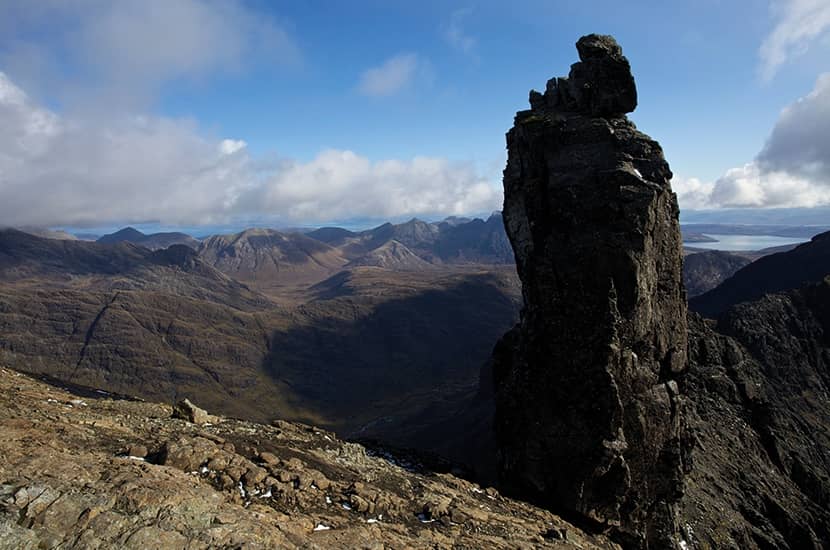Twenty-five years ago, my cousin Jock, a Scottish priest, rang in shock. Two priest friends, David and Norman, had been walking in the Cuillin in Skye. As Norman rounded a boulder, it dislodged and rolled him off the mountain. He screamed: ‘David, save me!’ They were his last words.
The Cuillin — or Black Ridge — slice the island of Skye in two. On a map they are a Spaghetti Junction of deranged scribbles. Closer to, they rise up like the fangs of Mordor in dizzying spires with names such as ‘The Executioner’. ‘The Inaccessible Pinnacle’ is something like Orkney’s Old Man of Hoy, only rising not out of the sea, but off the top of a mountain. The highest peak, Sgùrr Alasdair, is more than three times the height of the London Shard, or higher than ten Big Bens. Should you fall off it, it would take you 14 seconds to hit the sea.
‘Bagging Munros’ has a jaunty ring to it, and 11 of the Cuillins are Munros. But, as Simon Ingram tells us, climbing them is ‘harder, steeper, longer, scarier than anywhere else in Britain’. Some of the rock that forms them is gabbro, which grips nicely, like Velcro; but much is basalt, with a surface like wet soap. Even in summer, climbers contend with mist, darkness, high winds, frostbite, deep soft snow, deep hard snow, avalanches, ice-glazed rocks and — perhaps most perilous of all — loss of direction: owing to the magnetic nature of the rock, compasses are wildly confused.
No surprise, then, that since the first official fatality — the Liverpudlian John Thom on 2 September 1870 — there have been many more. As Hamish MacInnes, a Cuillin aficionado, tells Ingram: ‘You get so used to death. Except when a kid gets killed. You don’t get used to that.’
There are numerous reasons for Ingram not to succumb to the sinister seduction of the Cuillin. He’s a ‘normal experienced mountain walker’, not a climber. He’s easily scared — of skittering mice, when he spends the night in a bothy, of Highland cattle and, crucially, of heights. And he’s a husband and the father of two small children. ‘He died doing what he loved’: what comfort would that be to his four-year-old daughter?
Yet, since he first saw a picture of the Cuillin — ‘like a bombed-out cathedral’— in his teens, he’s felt both ‘gripped and rattled’. Nearly 40, he’s experiencing a ‘mid-life mountain crisis’. If he could just traverse the Black Ridge, it might ‘put an exclamation mark at the end of my British mountain ambitions’.
Ingram writes well, and after reading his introduction, and moving on to a section called ‘Ascent’, you are braced and ready to go. But it doesn’t quite happen. On page 123 he declares ‘I started to climb’ — but still he delays. Gradually it dawns on you that only about a fifth of this substantial book will be about Ingram’s adventures and the rest about the geology, geography, history, etymology, mythology, folklore and cartography not just of the Cuillin, but of Skye and beyond. He tells us he arrived on Skye with two large boxes of books for research. You feel the weight of them. And you begin to dread paragraphs beginning: ‘There are a few more things you need to know’, or ‘You’ll have to excuse the following digression’, or ‘I’d say there were thousands of pages I could write about this mountain range’. Help! Samuel Johnson wrote of Highlanders’ conversation: ‘The enquirer… knows less as he hears more.’ The longer Ingram gets on fact, the shorter on feeling.
This is frustrating, because his own Cuillin journey makes riveting reading. It takes him three pushes to complete it, the first in the company of a tall, laconic guide: Matt Barrett is not only superfit, he has recently rowed — rowed — to St Kilda for charity. He is determined to fulfil his clients’ Cuillin dreams, however ambitious. He has, for example, traversed the ridge with a casualty of thalidomide, who clung to the rocks with his teeth.
But Barrett is not with Ingram when things go wrong. Colin Thubron says that, when you travel, it’s as if you have a bird perched on each shoulder. If the going gets tough, one bird urges you to head for home. But the other whispers that crisis makes for cracking copy. By far the most riveting section of this book covers Ingram’s 50ft near-fatal fall off the ridge, his horrific injuries and his excruciating wait while the chopping of the mountain rescue helicopter bounces off the rocks around him like ‘thick nasty laughter’. It’s unputdownable.
There is something likeable about Ingram. When he survives his fall, you feel really glad. Glad, too, that he’s lived to tell another tale — if only next time it could be a bit snappier.






Comments